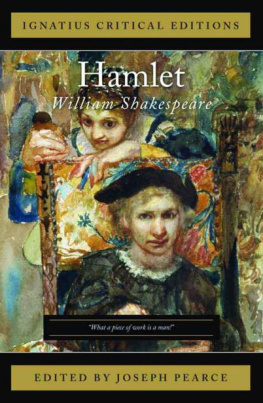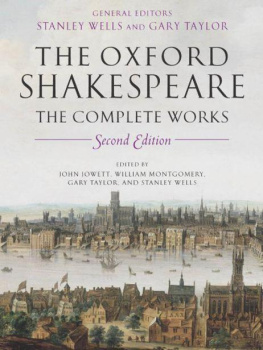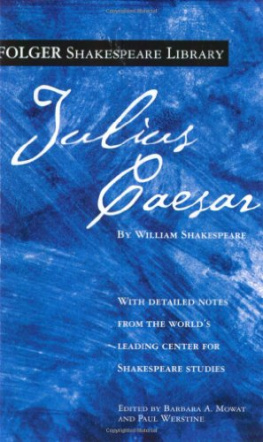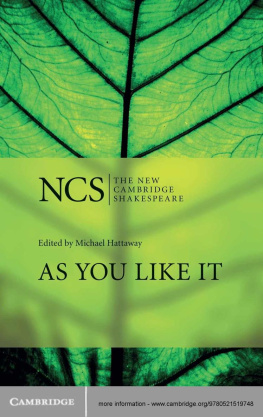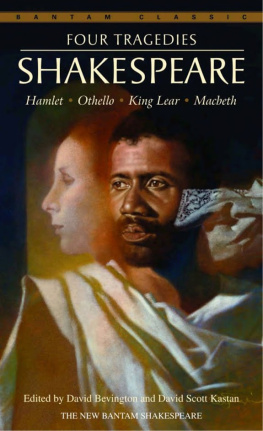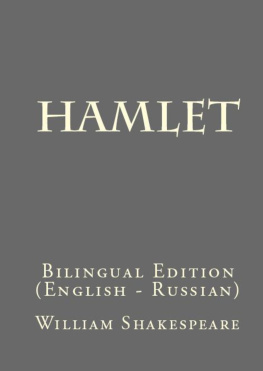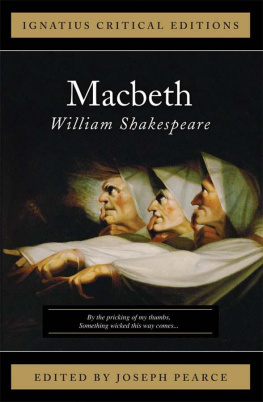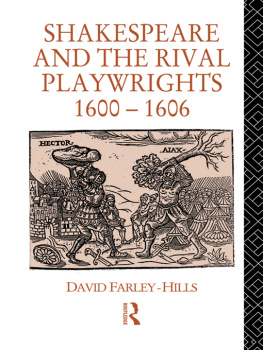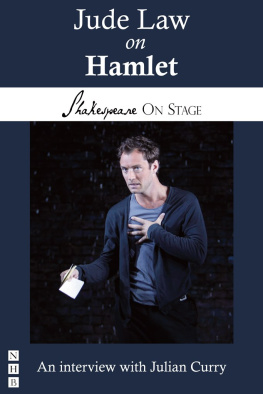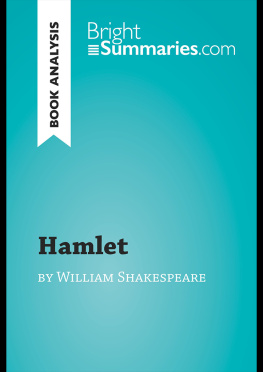William Shakespeare - Hamlet: Ignatius Critical Editions
Here you can read online William Shakespeare - Hamlet: Ignatius Critical Editions full text of the book (entire story) in english for free. Download pdf and epub, get meaning, cover and reviews about this ebook. year: 0, genre: Science. Description of the work, (preface) as well as reviews are available. Best literature library LitArk.com created for fans of good reading and offers a wide selection of genres:
Romance novel
Science fiction
Adventure
Detective
Science
History
Home and family
Prose
Art
Politics
Computer
Non-fiction
Religion
Business
Children
Humor
Choose a favorite category and find really read worthwhile books. Enjoy immersion in the world of imagination, feel the emotions of the characters or learn something new for yourself, make an fascinating discovery.
- Book:Hamlet: Ignatius Critical Editions
- Author:
- Genre:
- Year:0
- Rating:3 / 5
- Favourites:Add to favourites
- Your mark:
- 60
- 1
- 2
- 3
- 4
- 5
Hamlet: Ignatius Critical Editions: summary, description and annotation
We offer to read an annotation, description, summary or preface (depends on what the author of the book "Hamlet: Ignatius Critical Editions" wrote himself). If you haven't found the necessary information about the book — write in the comments, we will try to find it.
William Shakespeare: author's other books
Who wrote Hamlet: Ignatius Critical Editions? Find out the surname, the name of the author of the book and a list of all author's works by series.
Hamlet: Ignatius Critical Editions — read online for free the complete book (whole text) full work
Below is the text of the book, divided by pages. System saving the place of the last page read, allows you to conveniently read the book "Hamlet: Ignatius Critical Editions" online for free, without having to search again every time where you left off. Put a bookmark, and you can go to the page where you finished reading at any time.
Font size:
Interval:
Bookmark:
HAMLET WILLIAM SHAKESPEARE
This edition was first published in 2008. Cover art: Michail Vrubel, Hamlet and Ophelia
Russian State Museum, St. Petersburg, Russia Photo credit: Scala / Art Resource, N.Y. Cover design by John Herreid 2008 Ignatius Press, San Francisco
All rights reserved
ISBN 978-1-58617-261-9
Library of Congress Control Number 2008926772
Printed in the United States of America Tradition is the extension of Democracy through time; it is the proxy of the dead and the enfranchisement of the unborn. Tradition may be defined as the extension of the franchise. Tradition means giving votes to the most obscure of all classes, our ancestors.
It is the democracy of the dead. Tradition refuses to submit to the small and arrogant oligarchy of those who merely happen to be walking about. All democrats object to men being disqualified by the accident of birth; tradition objects to their being disqualified by the accident of death. Democracy tells us not to neglect a good mans opinion, even if he is our groom; tradition asks us not to neglect a good mans opinion, even if he is our father. I, at any rate, cannot separate the two ideas of democracy and tradition . K. K.
Chesterton Ignatius Critical EditionsTradition-Oriented Criticism for a new generation
Crystal Downing
Anthony Esolen
Gene Fendt
Richard Harp
Andrew Moran
Jim Scott Orrick
R. V. Young
Ave Maria University And let me speak to th yet unknowing world How these things came about. So shall you hear Of carnal, bloody, and unnatural acts; Of accidental judgments, casual slaughters; Of deaths put on by cunning and forcd cause; And, in this upshot, purposes mistook Falln on th inventors headsall this can I Truly deliver. (5.2.371-78) The first documentary record of Shakespeares Hamlet is its entry in the Stationers Register on July 26, 1602, but the play itself seems to have been written and performed as early as 1598. 1589). 1589).
Although Kyds play has been lost to posterity, it seems certain that it was performed regularly by the Chamberlains Men (Shakespeares acting troupe) during the early 1590s, and, as such, it is very likely that Shakespeare acted in it during that period. He would therefore have known the earlier play very well and was evidently prompted to write his own version of it. It is reasonable to conjecture that he chose to do so as a reaction against the tone or content of the original. Shakespeare had already been provoked into writing his play King John as a reaction against an earlier play entitled The Troublesome Reign of King John , and, a few years later, he would write King Lear to counter a similar bias in a play entitled The True Chronicle History of King Leir and His Three Daughters . It seems probable, therefore, that Shakespeare wrote Hamlet to counter aspects of the earlier play with which he disapproved and to which he wished to make a literary riposte. Since the Ur-Hamlet is no longer extant, it is impossible to know what exactly Shakespeare found objectionable in the earlier version, but the fact that Kyd was tried and imprisoned for atheism in 1593 suggests that Shakespeare sought to baptize the drama with his own profoundly Christian imagination.
As for the play itself, it is perhaps the most popular and well-known of all Shakespeares works and is also the longest and arguably the most difficult to understand. It has certainly puzzled generations of critics and continues to confuse and confound its readers with infuriating conundrums. Who exactly is Hamlet? Is he a noble and conscientious young man struggling heroically against the slings and arrows of outrageous fortune, or is he a hopelessly melancholic procrastinator? And what of the Ghost of Hamlets father? Is he who he says he is, or is he (or it) a demon hell-bent on bringing murder and anarchy to the kingdom of Denmark? And then there is Ophelia. Does Hamlet love her, or is his love, like his madness, merely feigned? And is Ophelia an innocent lamb who is slaughtered by the sins of others, or is she in some way culpable for her own madness and death? On a panoramic level, does the play present a moral vision of reality signaling the triumph of Christian hope, or does it point to the chasm of nihilistic despair? These puzzles, according to Peter Milward, are more than enough to turn Hamlet from a revenge tragedy to a problem play. No wonder we are left at the end with a feeling rather of bewilderment than of catharsis! No room is left for tears, as at the end of King Lear , but only for scratching of the head. There is no denying that Hamlet presents us with a difficult puzzle that seems insoluble.
Yet things are not always what they seem, as Hamlet reminds his mother: Seems, madam! Nay, it is; I know not seems. Tis not alone my inky cloak, good mother, Nor customary suits of solemn black, Nor windy suspiration of forcd breath, No, nor the fruitful river in the eye, Nor the dejected havior of the visage, Together with all forms, moods, shapes of grief, That can denote me truly. These, indeed, seem; For they are actions that a man might play; But I have that within which passes show These but the trappings and the suits of woe. (1.2.76-86) In these few words, Hamlet is exhibiting a deep understanding of metaphysics. He is echoing Aristotle and Saint Thomas Aquinas in his distinction between the essence of things and their accidental qualities. At its deepest level of meaning, Hamlet works on this metaphysical and ontological level.
The play deals with definitions , with the meanings of things, and with the difference between those things that essentially are and those that only seem to be. It is about what things mean , not about what things seem . And it is about learning to discover the difference between the two. It is the quest for the definite amid the clouds of unknowing. In order to understand Hamlet as Shakespeare understood it, we need to see the play through the playwrights profoundly Christian eyes. M. W. W.
Tillyard, who emphasized Shakespeares breadth of spiritual vision in Hamlet : I doubt if in any other play of Shakespeare there is so strong an impression of the total range of creation from the angels to the beasts....This way of looking at creation is powerfully traditional and Christian; and in Hamlet if anywhere in Shake speare we notice the genealogy from the Miracle Plays with their setting of Heaven, Purgatory, and Hell, as for instance in the heros description of himself as a fellow crawling between heaven and earth.... Hamlet is one of the most medieval as well as one of the most acutely modern of Shakespeares plays. And though the theme of spiritual regeneration may be absent from the plot, the setting includes the religious consciousness most eminently. The only questionable aspect of Tillyards otherwise excellent appraisal of the religious consciousness of the play is his assertion that spiritual regeneration may be absent from the plot. This is not the case. Hamlet begins, tempted to suicide, in the Slough of Despond, bogged down by the sins of others more than by his own transgressions, and ends with firm resolution and a serene resignation to the will of God: Not a whit, we defy augury: there is special providence in the fall of a sparrow.
If it be now, tis not to come; if it be not to come, it will be now; if it be not now, yet it will comethe readiness is all. Since no man owes of aught he leaves, what ist to leave betimes? Let be. (5.2.211-16) Hamlet has come a long way from the suicidal despondency of his first soliloquy in Act 1 to this willing acceptance in Act 5 of the benignity of Gods providence and his knowledge that the readiness is all. In between, he has descended Dantelike into the infernal depths and, like Dante, emerges through purgatorial fire into the gracious acceptance of the love of God. This is spiritual regeneration at its most sublime, albeit Shakespeare, unlike Dante, leaves his vision of paradise offstage, apart from the scantiest of glimpses offered in passing as the plot unfolds. It is perhaps the readiness of Hamlet in the plays final scene that provides the other key to solving the puzzle at the plays beguiling heart.
Next pageFont size:
Interval:
Bookmark:
Similar books «Hamlet: Ignatius Critical Editions»
Look at similar books to Hamlet: Ignatius Critical Editions. We have selected literature similar in name and meaning in the hope of providing readers with more options to find new, interesting, not yet read works.
Discussion, reviews of the book Hamlet: Ignatius Critical Editions and just readers' own opinions. Leave your comments, write what you think about the work, its meaning or the main characters. Specify what exactly you liked and what you didn't like, and why you think so.

